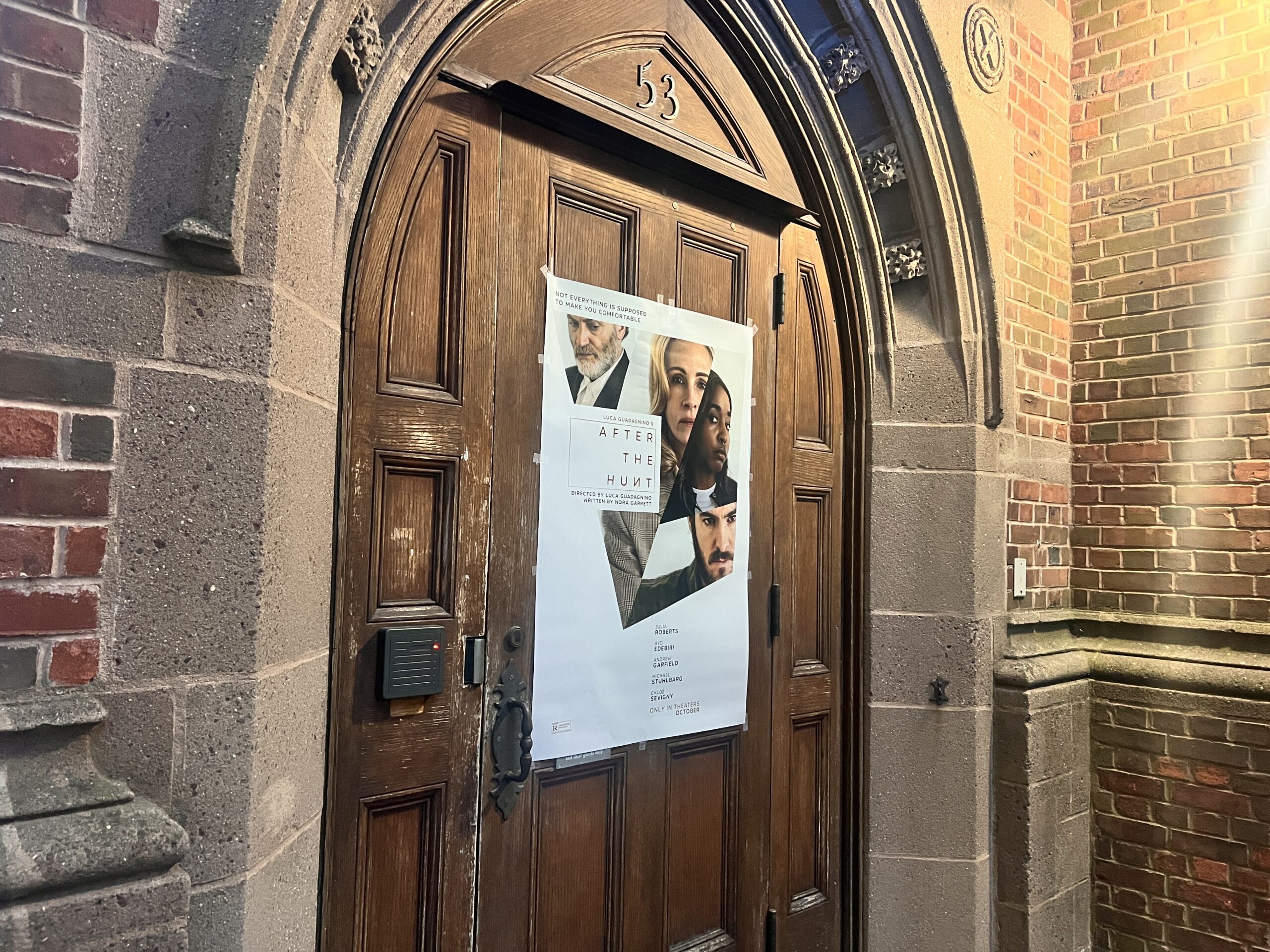‘After the Hunt’ draws mixed reactions at advanced screening on campus
The Yale Film Society hosted an early screening of Luca Guadagnino’s film “After the Hunt,” which tells a fictional story about characters at Yale.

Kamini Purushothaman, Contributing Photographer
Students packed a campus auditorium Tuesday evening for an advanced screening of Luca Guadagnino’s new film “After the Hunt,” which tells a fictional story about a group of characters at Yale.
“After the Hunt,” which will open nationwide on Oct. 17, tells the story of a Yale philosophy professor named Alma Olsson, played by Julia Roberts, whose student Maggie Price, played by Ayo Edebiri, accuses her colleague and close friend Hank Gibson, Andrew Garfield, of sexual assault.
Exploring the fraught relationships between mentor and student, institutional power within academia and the roles of gender and race within prestigious institutions, the public screening encouraged viewers to “share their thoughts and feelings on the film openly,” according to Film Programming Manager Marc Francis, who introduced the screening.
“I predict this is going to be a bizarre and maybe surreal experience for us watching this kind of film in the institution which is set,” Francis said.
After the opening scene, the film cuts to a black screen with the words, “It happened at Yale.”
While the film was not shot at the University, it depicts many familiar landmarks on campus and around New Haven — including Phelps Hall, Old Campus, Beinecke Plaza and Chapel West Liquor Shop.
The Yale logo was also featured on sweatshirts, posters and faculty ID cards that were shown at various points throughout the film.
After the screening, Crystal Feimster, a Black studies professor, and Joe Fischel, a women’s, gender, and sexuality studies professor, led a conversation on the racial and gender politics in the film.
Feimster praised the “brilliant acting” in the movie and the ambitious subject matter but said the plot development was “inconsistent.”
“I think it captured something about our political and cultural moment that is uncomfortable. There were moments of cringe, there were moments of truth and there were moments that made you think, ‘Really? We’re going there?’” Feimster said.
Feimster said that the primary tension of the movie focused on the dynamic between Alma and Maggie, exploring the relationship “between Black and white women when it comes to sexual narratives — who is believed and who isn’t.”
The movie focused on the misaligned motives of the three leading characters and how that impacted each character’s actions.
“At the end, we get this kind of battle between Black and white women for resources,” Feimster said, referring to the context of a patriarchal society in which both women are vying for success in predominantly male, predominantly white spaces.
Feimster emphasized that, for her, the movie’s primary value comes from asking students and staff at Yale to “reckon” with their place at the University amid the complex interplay of social dynamics.
Fischel praised the commitment to recreating the University.
“The director went so hard on the Yale ID and Yale scenes — all that stuff was accurate,” he said.
Additionally, Fischel echoed praise for the performances of the star-studded cast, mentioning the strength of Julia Roberts’ performance in many intense scenes.
However, Fischel also criticized the movie for being “libelous toward Black women” due to what he saw as poorly executed commentary on class and an overt focus on Julia Roberts’ character.
Throughout the movie, Alma’s suffering and perspective is emphasized over Maggie’s experience with her own sexual assault. Fischel also argued that, at many points in the film, the “portrayal of Maggie and her trans/nonbinary partner are so much a spectacle.”
In an email to the News, Fischel added that the film’s faithful adherence to imitating Yale was undermined by the fact that none of it was filmed on campus, hindering “the viewer’s confidence in ‘what happened.’”
“It seems to me a rather embarrassing flaw of the film that for all of its effort to make Yale a main character, there is nothing at all added to the film — emotionally or politically — by its taking place on our campus,” Fischel wrote.
Luca Guadagnino also directed “Challengers,” which came out in 2024.







